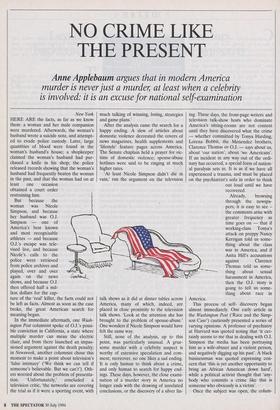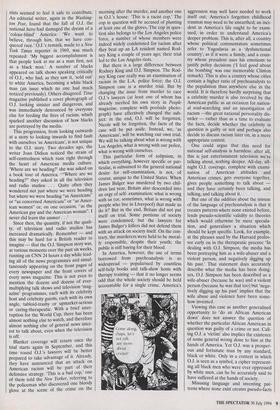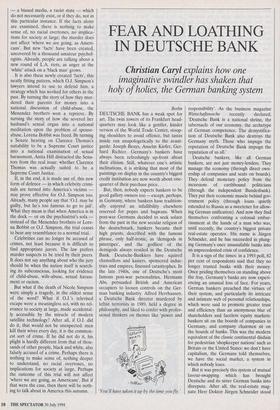NO CRIME LIKE THE PRESENT
Anne Applebaum argues that in modern America
murder is never just a murder, at least when a celebrity is involved: it is an excuse for national self-examination
New York HERE ARE the facts, as far as we know them: a woman and her male companion were murdered. Afterwards, the woman's husband wrote a suicide note, and attempt- ed to evade police custody. Later, large quantities of blood were found in the woman's husband's house; a shopkeeper claimed the woman's husband had pur- chased a knife in his shop; the police released records showing that the woman's husband had frequently beaten the woman in the past, and that the woman had on at least one occasion obtained a court order restraining him.
But because the woman was Nicole Simpson, and because her husband was O.J. Simpson — one of America's best known and most recognisable athletes — and because 01's escape was tele- vised live, and because Nicole's calls to the police were retrieved from police archives and played, over and over again on the news 6044,4_ shows, and because O.J.
then offered half a mil- lion dollars for the cap- ture of the 'real' killer, the facts could not be left as facts. Almost as soon as the case broke, the great American search for meaning began.
In the immediate aftermath, one Wash- ington Post columnist spoke of 0.J.'s possi- ble conviction in California, a state where multiple murder can mean the electric chair, and from there launched an impas- sioned argument against the death penalty; in Newsweek, another columnist chose this moment to make a point about television's 'false intimacy' ('We think we can tell if someone's believable. But we can't'). Oth- ers worried about the problem of presenta- tion. 'Unfortunately,' concluded a television critic, 'the networks are covering the trial as if it were a sporting event, with
much talking of winning, losing, strategies and game plans.'
After the analysis came the search for a happy ending. A slew of articles about domestic violence decorated the covers of news magazines, health supplements and `lifestyle' feature pages across America. The Senate chaplain held a prayer for vic- tims of domestic violence; spouse-abuse hotlines were said to be ringing at much higher rates.
'At least Nicole Simpson didn't die in vain,' ran the argument on the television talk shows as it did at dinner tables across America, many of which, indeed, are placed in close proximity to the television talk shows. 'Look at the attention she has brought to the problem of spouse-abuse.' One wonders if Nicole Simpson would have felt the same way.
Still, none of the analysis, up to this point, was particularly unusual. A grue- some murder with a celebrity suspect is worthy of extensive speculation and com- ment; moreover, no one likes a sad ending. It is only human to think about a crime, and only human to search for happy end- ings. These days, however, the close exami- nation of a murder story in America no longer ends with the drawing of unrelated conclusions, or the discovery of a silver lin-
ing. These days, the front-page writers and television talk-show hosts who dominate America's sitting-rooms are not content until they have discovered what the crime — whether committed by Tanya Harding, Lorena Bobbit, the Menendez brothers, Clarence Thomas or O.J. — says about us, about 'our nation', about 'we Americans'. If an incident in any way out of the ordi- nary has occurred, a special form of nation- al paralysis sets in. It is as if we have all experienced a trauma, and must be placed on the psychiatrist's sofa in order to think out loud until we have recovered.
Already, browsing through the newspa- pers, it is easy to see the comments arise with greater frequency as time goes on — that if working-class Tanya's attack on preppy Nancy Kerrigan told us some- thing about the class war in America, and if Anita Hill's accusations against Clarence Thomas told us some- thing about sexual harassment in America, then the O.J. story is going to tell us some- thing about race in America.
This process of self- discovery began almost immediately. One early article in the Washington Post ('Race and the Simp- son Case') cautiously presented a series of varying opinions. A professor of psychiatry at Harvard was quoted noting that 'it cer- tainly seems to me that in dealing with O.J. Simpson the media has been portraying him as a wife-abuser and a violent person, and negatively digging up his past'. A black businessman was quoted expressing con- cern that 'this is yet another opportunity to bring an African American down hard', while a political activist thought that 'any- body who commits a crime like this is someone who obviously is a victim'.
Once the subject was open, the colum-
nists seemed to feel it safe to contribute. An editorial writer, again in the Washing- ton Post, found that the fall of 0_,T. the national hero had damaged the dream of a `colour-blind' America: 'We want to believe, through him, that we have con- quered race.' O.J.'s remark, made to a New York Times reporter in 1969, was much repeated: 'My biggest accomplishment is that people look at me as a man first, not as a black man.' A number of blacks appeared on talk shows speaking critically of O.J., who had, as they saw it, `sold out' to white America, becoming a white black man (an issue which no one had much noticed previously). Others disagreed. Time magazine published a cover photograph of O.J. looking sinister and dangerous, and was immediately denounced by everyone else for feeding the fires of racism, which sparked another discussion of how blacks are portrayed by the media. This progression, from looking outwards at a story to looking inwards to find fault with ourselves 'as Americans', is not unique to the O.J. story. Two decades ago, the writer Joan Didion noticed the strain of self-centredness which runs right through the heart of American media culture. `Where are we heading?' she was asked on a book tour of America. "Where are we heading?" they asked in all the television and radio studios . . . Quite often they wondered not just where we were heading but where we were heading "as Americans" or "as concerned Americans" or "as Amer- ican women" or, on one occasion, "as the American guy and the American woman". I never did learn the answer . .
Since then, the quantity, if not the quali- ty, of television and radio studios has Increased dramatically. Remember — and this may be hard for a British reader to imagine — that the O.J. Simpson story was, at various moments over the past six weeks, running on CNN 24 hours a day while lead- ing all of the news programmes and simul- taneously appearing on the front pages of every newspaper and the front covers of every news magazine. This is not even to mention the dozens and dozens of ever- multiplying talk shows and television 'mag- azine' programmes, each with its celebrity host and celebrity guests, each with its own angle, tabloid-trashy or upmarket-serious or caring-therapeutic. With a brief inter- ruption for the World Cup, there has been almost nothing else to watch, and therefore almost nothing else of general news inter- est to talk about, even when the television is off. Blanket coverage will return once the trial starts again in September, and this time round O.J.'s lawyers will be better prepared to take advantage of it. Already, they have announced that an attack on American racism will be part of their
defensive strategy. 'This is a bad cop,' one of them told the New Yorker, referring to
the policeman who discovered one bloody glove at the scene of the crime on the morning after the murder, and another one in O.J.'s house: 'This is a racist cop.' The cop in question will be accused of planting at least one of the gloves. The cop in ques- tion also belongs to the Los Angeles police force, a number of whose members were indeed widely condemned for racism after they beat up an LA resident named Rod- ney King a couple of years ago; their trial led to the Los Angeles riots.
But there is a large difference between Rodney King and O.J. Simpson. The Rod- ney King case really was an examination of racism in the L.A. police force; the O.J. Simpson case is a murder trial. But by changing the issue from murder to race O.J.'s lawyers (at least one of whom has already merited his own story in People magazine, complete with poolside photo- graph) have effectively changed the sub- ject: in the end, O.J. will be forgotten, Nicole will be forgotten, the facts of the case will be put aside. Instead, we, 'as Americans', will be watching our own trial. We will be talking about what is wrong with Los Angeles, what is wrong with our police, what is wrong with ourselves.
This particular form of solipsism, in which everything, however specific or par- ticular, is subsumed to the general national desire for self-examination, is not, of course, unique to the United States. When James Bulger was murdered by two chil- dren last year, Britain also descended into an orgy of self- examination: what is wrong with us (or, sometimes, what is wrong with people who live in Liverpool) that made us do it? But in the end, Britain did not put itself on trial. Some portions of society were condemned, but the lawyers for James Bulger's killers did not defend them with an attack on society itself. On the con- trary, the murderers were held to be moral- ly responsible, despite their youth; the public is still baying for their blood. In America, however, the use of terms borrowed from psychoanalysis is so widespread — popularised by countless self-help books and talk-show hosts with therapy training — that it no longer seems odd that the whole society should be held accountable for a single crime. America's
aggression may well have needed to work itself out; America's forgotten childhood traumas may need to be unearthed; an inci- dent in America's life ought to be exam- ined, in order to understand America's deeper problem. This is, after all, a country whose political commentators sometimes refer to Yugoslavia as a 'dysfunctional country', as if it were a family, and a coun- try whose president uses his emotions to justify policy decisions CI feel good about the bombing' was one memorable Clinton remark). This is also a country whose cities contain a higher ratio of psychoanalysts to the population than anywhere else in the world. It is therefore hardly surprising that a celebrity murder is also received by the American public as an occasion for nation- al soul-searching and an investigation of racism —the great national personality dis- order — rather than as a time to evaluate the facts, decide whether the celebrity in question is guilty or not and perhaps also decide to discuss racism later on, in a more appropriate context.
One could argue that this need for national self-analysis is harmless: after all, this is just entertainment television we're talking about, nothing deeper. All-day, all- night O.J. coverage, complete with exami- nation of American attitudes and American crimes, gets everyone together, gives people something to talk about and they have certainly been talking, and talking, and talking about it.
But one of the oddities about the misuse of the language of psychoanalysis is that it creates patterns where none existed before, lends- pseudo-scientific validity to theories which would otherwise be mere specula- tion, and generalises a situation which should be kept specific. Look, for example, at the phrases used by the Harvard profes- sor early on in the therapeutic process: 'In dealing with O.J. Simpson, the media has been portraying him as a wife-abuser and a violent person, and negatively digging up his past.' That statement does accurately describe what the media has been doing: yes, O.J. Simpson has been described as a wife-abuser (because he was) and a violent person (because he was that too) but 'nega- tively digging up his past' implies that the wife abuse and violence have been some- how invented.
Viewing this case as another generalised opportunity to 'do an African American down' does not answer the question of whether the particular African American in question was guilty of a crime or not. Call- ing O.J. a 'victim' also implies the existence of some general wrong done to him at the hands of America. Yet O.J. was a prosper- ous and fortunate man by any standard, black or white. Only in a context in which O.J. is seen as a symbol, a cipher represent- ing all black men who were ever oppressed by white men, can he be accurately said to have suffered at the hands of society. Misusing language and inventing pat- terns where none exist creates pseudo-facts — a biased media, a racist state — which do not necessarily exist, or if they do, not in this particular instance. If the facts alone are examined, there is nothing to make sense of, no racial overtones, no implica- tions for society at large; the murder does not affect 'where we are going, as Ameri- cans'. But new 'facts' have been created, uncovered by a thousand amateur psychol- ogists. Already, people are talking about a new round of L.A. riots, as anger at the 'white' attack on a 'black man' grows.
It is also these newly created 'facts', this neatly fitting pattern, which O.J. Simpson's lawyers intend to use to defend him, a strategy which has worked for others in the past. By turning the story of how they mur- dered their parents for money into a national discussion of child-abuse, the Menendez brothers won a reprieve. By turning the story of how she severed her husband's sexual organ into a national meditation upon the problem of spouse- abuse, Lorena Bobbit was freed. By turning a Senate hearing on Clarence Thomas's suitability to be a Supreme Court justice into a national examination of sexual harassment, Anita Hill distracted the Sena- tors from the real issue: whether Clarence Thomas was actually suited to be a Supreme Court Justice.
If, in the end, it is made use of, this new form of defence — in which celebrity crimi- nals are turned into America's victims may prove effective for O.J. Simpson too. Already, many people say that 'O.J. may be guilty, but he's too famous to go to jail'. What they mean is that when America is in the dock — or on the psychiatrist's sofa instead of the Menendez brothers or Lore- na Bobbit or O.J. Simpson, the trial ceases to bear any resemblance to a normal trial.
Celebrities can no longer be accused of crimes, not least because it is difficult to find appropriate jurors. The law prefers murder suspects to be tried by their peers. It does not say anything about who the jury should be when the nation itself is search- ing its subconscious, looking for evidence of child-abuse, wife-abuse, sexual harass- ment or racism.
But what if the death of Nicole Simpson were simply a tragedy, in the oldest sense of the word? What if O.J.'s televised escape were a meaningless act, with no rel- evance to society at large, made accidental- ly accessible by the miracle of modern satellite technology? After all, if O.J. did do it, that would not be unexpected: men kill their wives every day, it is the common- est sort of crime. If he did not do it, his plight is hardly different from that of thou- sands of other people, black and white, also falsely accused of a crime. Perhaps there is nothing to make sense of, nothing deeper to understand, no racial overtones, no implications for society at large. Perhaps the outcome of this trial will not affect 'where we are going, as Americans'. But if that were the case, then there will be noth- ing to talk about in America this autumn.




















































 Previous page
Previous page